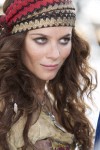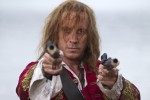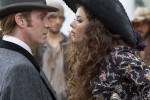Syfy Digital Press Tour: Neverland looks to the beginning
by Doc on Oct.15, 2011, under Television
How did Peter Pan and Captain Hook end up in Neverland? How did Peter learn to fly? Was Hook always a pirate? How is it they never grow up? In general, how did they become the characters we are familiar with?
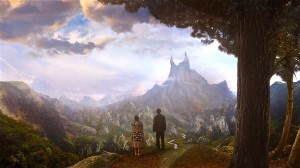 That is the premise behind the upcoming Neverland – a prequel or origin story to J.M. Barrie’s Peter Pan, and stars Rhys Ifans (Notting Hill, The Replacements, Harry Potter and the Deathly Hallows, Part 1), Anna Friel (Limitless, Land of the Lost), and Charlie Rowe (The Golden Compass), who joined us along with Syfy President of Original Content Mark Stern to discuss the mini-series which will air on Sunday, December 4th and Monday December 5th at 9pm ET.
That is the premise behind the upcoming Neverland – a prequel or origin story to J.M. Barrie’s Peter Pan, and stars Rhys Ifans (Notting Hill, The Replacements, Harry Potter and the Deathly Hallows, Part 1), Anna Friel (Limitless, Land of the Lost), and Charlie Rowe (The Golden Compass), who joined us along with Syfy President of Original Content Mark Stern to discuss the mini-series which will air on Sunday, December 4th and Monday December 5th at 9pm ET.
So, what was it like being part of a classic story and playing such classic characters? “It wasn’t daunting. I mean, what’s daunting is, I guess, that we — that everyone knows the story of Peter Pan,” Ifans said. “And what was appealing, I guess, for all three of us is that this goes a long way, if not all the way, to explain how Peter Pan becomes Peter Pan, how he acquires these magical powers and how Captain Hook loses his hand.”
Anna Friel added, “I have a six-year-old daughter. She just went, ‘Mommy, there’s no way you can’t not do ‘Neverland.” She was very excited. She wasn’t too happy about the idea that I might potentially kill Peter Pan. She thought that was stupid, but she was very excited about it.”
The youngest of the bunch, Charlie Rowe, said “Yeah. No. I was pretty apprehensive because I, like, have quite big boots to fill. It was great fun, a completely different story to the original story. I think we did it justice.”
Mark Stern praised Charlie. “I have to say it was really a mind-blowing performance for someone your age. How old are you?” “I’m 15. Thank you very much,” Charlie responded.
Mark added, “To take on a roll that big is really impressive, if I do say so myself…what was it like to work with actors of that caliber?”
“I thought I am incredibly lucky to work with such great people and amazing actors,” he answered. “I learned a lot, particularly from Rhys and Anna. They are like my mother and father on the set even though my mother and father were actually on the set, and I …”
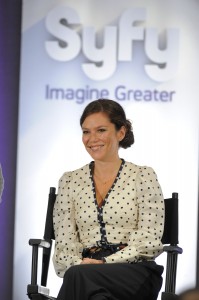 “Big sister. Big sister,” Anna interjected.
“Big sister. Big sister,” Anna interjected.
“Yeah. I learned a lot — yeah, I learned a lot from them. Thank you.”
Anna added more praise for Charlie, “You were an absolute pleasure. I think I’ve got a very bright star on the horizon sitting right next to me.”
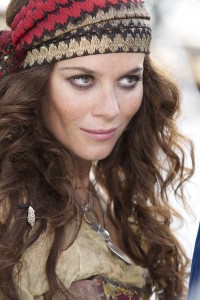 How about Anna’s role of the pirate Captain Bonny? “It was great fun. I just loved the costumes. I played Bonny. We decided to make her Irish with the accent. And Nick [Willing, who also directed Tin Man and Alice], our director and writer, was just a joy to work with. I think we did about a three-and-a-half, four-month shoot, and never once did he complain of tiredness, and he kept the energy on the set all the time. It was great, although we worked with a lot green. Green became our least favorite color. I was like, ‘Oh, another green screen.’ The effects are amazing. I have not seen it done to that degree.”
How about Anna’s role of the pirate Captain Bonny? “It was great fun. I just loved the costumes. I played Bonny. We decided to make her Irish with the accent. And Nick [Willing, who also directed Tin Man and Alice], our director and writer, was just a joy to work with. I think we did about a three-and-a-half, four-month shoot, and never once did he complain of tiredness, and he kept the energy on the set all the time. It was great, although we worked with a lot green. Green became our least favorite color. I was like, ‘Oh, another green screen.’ The effects are amazing. I have not seen it done to that degree.”
“It’s cool, huh?”, Rhys said about the green screen shooting. “It was nice to use the imagination. We had these big boards that Nick showed us every day and said, ‘This green screen is going to look like this.’ The whole imagination was suspended in disbelief. It was a good challenge.”
As for his character, who transforms a number of times during the story and playing such a character, Rhys says, “Well, I mean, it’s thrilling, and that’s the beauty of a miniseries is that, in a film, you wouldn’t have the time that a miniseries offers to explore such complexities. And it is a real, kind of, roller coaster, model roller coaster, for Hook.”
Questions were then asked from the floor.
Question: “We’ve seen kind of a resurgence of fairy tales in movies and television lately. Why do you feel that’s happening now? And do you feel that there are certain projects that have happened lately that have kind of paved the way for this?”
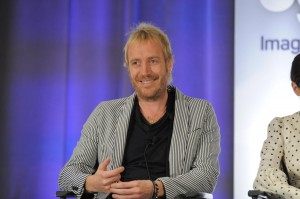 Rhys: “Well, you know, given this kind of fragile economic climate, you know, maybe there’s a need in all of us to escape to somewhere like Neverland where cash isn’t an issue.”
Rhys: “Well, you know, given this kind of fragile economic climate, you know, maybe there’s a need in all of us to escape to somewhere like Neverland where cash isn’t an issue.”
Anna: “Yeah. It’s one of the greatest stories ever written, and now, with all of the effects we have available, we want to see them retold and use those effects.”
Rhys: “And I think these stories, you know, they come in waves, you know. It’s a title thing, you know, and there’s something kind of primal in all of these stories that speaks to everyone. That’s why we keep retelling them, revisiting them.”
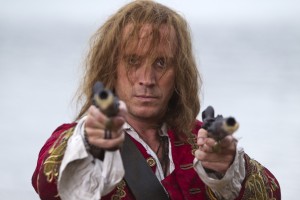 I asked Rhys: “You’ve played a somewhat wide variety of characters on various movies. For this particular role of Captain Hook, was there any particular inspiration you drew from for this role, or did you just kind of develop it, you know, as a fresh character?”
I asked Rhys: “You’ve played a somewhat wide variety of characters on various movies. For this particular role of Captain Hook, was there any particular inspiration you drew from for this role, or did you just kind of develop it, you know, as a fresh character?”
Rhys: “We all know the Hook that we were presented with in the novel, and that Hook is essentially bad to the bone. And I wanted to kind of explore a journey, you know. How would a man become that bad? What would it take for a man to shed pretty much all of his moral fiber when — and what happens to the mind when it’s offered eternal life? Does it corrupt, or does it illuminate? In Hook’s case, it corrupts, but it also liberates him from a very, kind of, stifled and repressed Edwardian England. Bonny liberates him completely and sexually, which wouldn’t have been the case in England. Men was scared of women, and women were scared of men. So it’s a kind of double-edged sword, and it’s an interesting question, you know. What’s the price of liberty? So that was all very, kind of, interesting to play.”
Mark: “And an interesting surrogate father-son relationship that you have with Peter that kind of pays the price for that.”
Rhys: “Yeah. That kind of changes. You know, that’s the kind of model dynamic, I guess, in the whole thing is our relationship, and as Charlie becomes — as Charlie is — Peter becomes better, Hook becomes worse. Yes, I think it’s very moving, that whole dynamic.”
Question: “I’ve got a question about the action in the film because there are a lot of fighting scenes and action scenes. How much training do you actually have to do for the fencing and the sword fighting, if at all?”
Anna (turning first towards Charlie and then to Rhys): “Go, Charles. What was it for fencing? You had a lot more, didn’t you?”
Rhys: “I’m just a natural.”
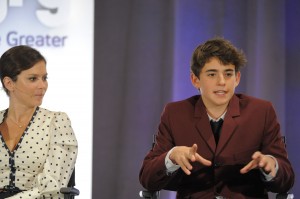 Charlie: “Me and Anna have had a lot of lunch breaks just trying to beat each other with swords, which was fun. And we did, like, long sessions on wires and stuff which is pretty exciting stuff. I mean, it’s every boy’s dream and every man’s dream. I shouldn’t say just a boy.”
Charlie: “Me and Anna have had a lot of lunch breaks just trying to beat each other with swords, which was fun. And we did, like, long sessions on wires and stuff which is pretty exciting stuff. I mean, it’s every boy’s dream and every man’s dream. I shouldn’t say just a boy.”
Rhys: “It’s great. You know, we did work quite intensely initially on the fighting, and you kind of just acquire the skill. So as the fights progressed in the film, we spent — because we were so — we became so adept early on, we spent kind of less and less time because we became, sort of, fighting with direction better, but also, you know, CGI helps.”
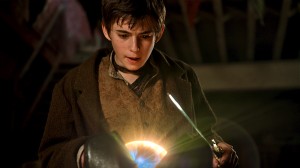 Charlie: “I think the whole shoot was pretty intense, but I think Nick, the director, just sort of made it a lot less and just a lot more — a very happy place, really. The pressure didn’t really get to us because Nick was just there, making us all feel good. He did a good job of it.”
Charlie: “I think the whole shoot was pretty intense, but I think Nick, the director, just sort of made it a lot less and just a lot more — a very happy place, really. The pressure didn’t really get to us because Nick was just there, making us all feel good. He did a good job of it.”
Question: “I was just curious. Since there’s so much of Peter Pan out there and it’s kind of hard to avoid it growing up or being anywhere, how did you — like, what did you use for inspiration to try to make your characters unique, to try to make sure that we weren’t going through the same thing again, that you brought something totally different?”
Anna: “I think we’ve already been given that with a very unique script. It was a very different take on it. It was a prequel to Peter Pan. So you were already telling a different story. And, for me, it’s a new character. So I had a massive scope of choice of emotions and characteristics as to what to give her. There’s no Wendy. So that makes it — it makes it different from the first story.”
Charlie: “I tried to avoid watching “Hook” and all of that before getting the part. I just tried to talk to Nick because I think — I think Nick — Nick Willing is Peter Pan, really. So I just tried to involve him into my part because I think — yeah, I think he’s still a child. If you meet him, he’s a complete child, and it’s his little baby, this film. And so I just tried to involve him as much as I can into the parts I was doing. And, yes, my part is basically just Nick, very honestly.”
Question: “This question is for Rhys. I’ve always felt personally that Hook is kind of a one-dimensional character. You gave him a lot more depth, and I didn’t think your approach was going from a good man to an evil man. It was more like a descent into madness. Would you say that was your approach?”
Rhys: “Yes, absolutely, and I think eternal — the question of eternal life — and I have much to think about it — it is maddening, but we’ve got madness coming — a freedom. But that freedom eventually corrupts, I think, and it is a descent into madness. You are right. And I’m glad you noticed that. Thank you.”
Question: “Everybody looks at Peter Pan as a family type of story. How would you say that “Neverland” will resonate with yours?”
Rhys: “Well, it is a family — the original is very much a family story, and, you know, there are kind of dark, adult prequel, but it engages all ages. There’s questions of father-son and with a kind of union, Freudian sexual questions, you know. So there’s many kinds of emotional frets and dynamics that appeal to all ages, and particularly with “Neverland,” you know. When we read the novel, Hook and Peter are already embedded in Neverland. So I think what gives us another connection to Neverland is that we see them as — albeit in another time, but we see them as, you know, human beings who live in a world where you eventually die. So we see what the wonder of somewhere — in Neverland, somewhere like Neverland, what it does to the psyche. And in Peter’s case, it makes him good, and in my case, it makes me very, very bad.”
Anna: “And in my case, it makes me evil.”
Mark: “Well, Bonny is an interesting character because she actually has a whole different — she comes from a different time and has a different need and agenda, and into her life comes this kind of, like, new — it’s like when you’ve lived with the same people for a long, long time, and all of a sudden here come these new people to play with.”
Anna: “She’s also the only woman around for 20 years. She’s not had any other female company. So when Hook arrives, it’s fresh, new blood. He’s one who can bring her knowledge from another world. I think she’s learned very manipulatively to letting her female — the power of her female prowess and how to use and abuse that.”
Mark: “And it is interesting in the way that she comes between the father-son. It is this very, kind of, classic story of a woman that comes into a boy’s father’s life and what that does to that dynamic.”
Anna: “Yeah. I love the dark undertones of the story. I think it makes it very available for both children and adults. I got both of those views from my daughter and from my mother and father. They enjoyed it for totally different reasons, and I think that’s why it’s so appealing, because it appeals to such a wide and varied audience.”
Rhys: “It’s also interesting, what you said, that it has that kind of stepmother theme as well, which runs through so many fairy tales. I think another exciting, kind of, dynamic and an attitude is that we as humans in Neverland are the aliens. So Bonny is essentially visited by a superior technological species which, again, you know, is a theme that runs through certainly a lot of sci-fi.”
Question: “Obviously, “Neverland” is a prequel to “Peter Pan.” We’ve had that in the past with “Star Wars.” Is it true you are doing it with “Lord of the Rings”? What do you think makes movies like that where it’s so appealing to the audience?”
Anna: “Because the story is good to start with. You want to know what happened beforehand. That’s the only way you can go out and do sequel after sequel after sequel. I think we are intrigued about what happend before the story even started, and it seems to be — and I’ve followed others’ work thus far. And particularly with a story like Neverland, it has never been done before. Why can Peter Pan fly? Why is there eternal life? Why do you never grow old? It’s kind of like an age-old vampire story in a way.”
Charlie: “Every kid in the world has grown up with these unbelievable stories, and everyone has their own different idea of why and how they got there. And that’s why I think it’s great that we’ve got all of these different ones like “Wicked” and now “Neverland,” you know, coming up because it’s basically someone’s complete imagination. It’s — everyone has got a different idea of why they are there.”
Question: “I have one quick — a couple quick questions. First off, the scenery looks beautiful. I know a lot of it was shot on a chromakey green screen, that type of thing, but can you go into the locations of the shoot, how long it took to shoot, how many people were involved in the whole process for this series?”
Anna: “We started off in Italy, and that was the most exciting part of the shoot for me. Was it for you, to be shot in a real boat?”
Charlie: “I had been there for ages as well. I did a film about pirates in the 1800s as well. 1900s, Excuse me.”
Anna: “Wasn’t it the Damascus? The pirates they used for that? And it still sits there today. We didn’t, obviously, take it out to sea. It was moored, but it was a spectacular thing to look at.”
Charlie: “Yeah. It was quite amazing.”
Anna: “We were in Genoa, Italy and then Ireland for the rest of it so two really remarkable locations with fantastic crews.”
Rhys: “A lot of the exteriors were, you know — such as the Indian reservation or the Indian lands were shot in Parkland in Ireland. The London stuff, the exterior stuff, was shot in Dublin, which has a lot of Georgian architecture, which would have suited. And then “Neverland” ironically was filmed in disused toilet paper warehouse just outside Dublin.”
And that wrapped up the panel. I have already seen a rough cut Neverland, and if the effects were unfinished then I can only say it is going to look SPECTACULAR. Expect a more thorough review of it soon.

